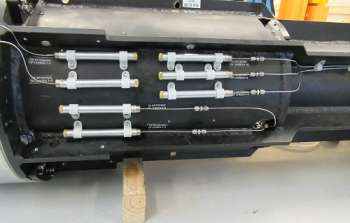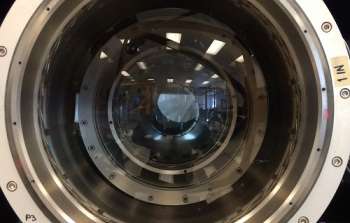sci18098 — Announcement
GMOS-S Bubbles No More
August 15, 2018
GMOS-S collimator after the modification of the inter-lens oil hydraulic system. The aluminium tubes are the oil reservoirs, connected by the pipes to their respective interfaces.
GMOS-S is currently off the telescope for remedial action on the oil interfaces between lenses in its optical system. These units are sealed but nonetheless suffer, over time, from oil loss due to slow leakage. When an appreciable “bubble” has built up within the interface, the lens system produces increased orientation-dependent scattering that affects the flat field and throughput in ways that are difficult to correct. Hence, in the recent engineering period, now coming to a close, we extracted the collimator from GMOS-S (this had never been done since instrument commissioning 17 years ago) and refilled the oil interfaces. At the time of writing, the collimator has just been inserted back into the instrument and alignment has checked out well. We anticipate GMOS being back in night-time operations after the telescope maintenance shutdown, which ends on 31-August. At the same time, we made modifications to the fill system that will enable future refills to be done more easily and without such invasive action. Here we show a couple of images of the work.
About the Announcement
| Id: |
ID
sci18098
|

